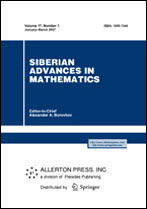|
This article is cited in 1 scientific paper (total in 1 paper)
Positive reducibilities, extreme numberings, and completeness
M. Kh. Faizrahmanovab
a Kazan Federal University, Kazan, 420008, Russia
b Scientific-Educational Mathematical Center of Volga Federal District
Abstract:
In the present article, we study universal, minimal, and complete numberings of families of arithmetic sets. We show that, for every $m\in\mathbb{N}$ and every nontrivial $\Sigma^0_{m+2}$-computable family $\mathcal{S}$, there exists a $\Sigma^0_{m+2}$-computable numbering that is not universal with respect to positive reducibilities and is complete with respect to each element $B\in\mathcal{S}$. For finite families of computably enumerable sets, we obtain necessary and sufficient conditions for existence of numberings that are complete, computable, and not universal with respect to positive reducibilities. For every infinite $\Sigma^0_{m+2}$-computable family $\mathcal{S}$ and every element $B\in\mathcal{S}$, we construct a $\Sigma^0_{m+2}$-computable numbering that is complete with respect to $B$ and minimal with respect to classical and positive reducibilities.
Key words:
numbering, $\Sigma^0_n$-computable numbering, reducibility for numberings, $e$-reducibility, $p$-reducibility, universal numbering, minimal numbering, complete numbering.
Received: 15.08.2022
Revised: 17.04.2023
Accepted: 17.05.2023
Citation:
M. Kh. Faizrahmanov, “Positive reducibilities, extreme numberings, and completeness”, Mat. Tr., 26:1 (2023), 176–191; Siberian Adv. Math., 33:3 (2023), 204–213
Linking options:
https://www.mathnet.ru/eng/mt694 https://www.mathnet.ru/eng/mt/v26/i1/p176
|


|





 Contact us:
Contact us: Terms of Use
Terms of Use
 Registration to the website
Registration to the website Logotypes
Logotypes








 Citation in format
Citation in format 
